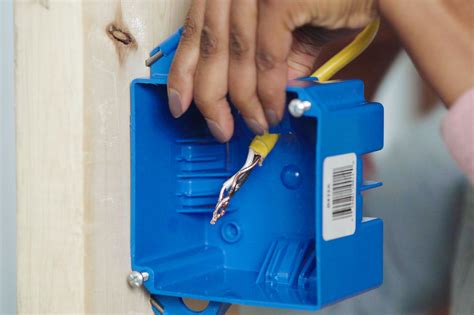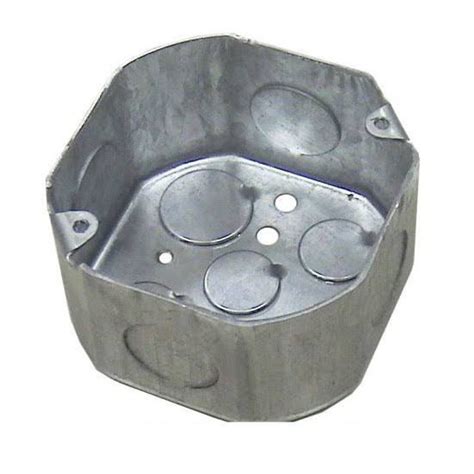electric box or plastic box different 15 amps: A cable labeled "14-2 with ground" will have two insulated conductors with . $9.98
0 · wiring plastic electrical box knockouts
1 · the metal junction box
2 · plastic outlet box vs metal
3 · plastic or metal electrical boxes
4 · plastic junction boxes electrical lowe's
5 · metal vs plastic gang box
6 · grounding metal electrical boxes
7 · are metal electrical boxes safe
Fridge Cold (40°F/4.4°C) up to 6 Hours and Chilled (50°F/10°C) up to 12 Hours! Add kitchen tools to your collection with Costco's great selection of food preparation and preservation items!
While electrical boxes have many variations, they all fall into one of two categories: plastic boxes or metal boxes. Sometimes, the choice is clear-cut and obvious, mainly for grounding. Other times, it's a matter of personal preference. Generally, do-it-yourselfers prefer .15 amps: A cable labeled "14-2 with ground" will have two insulated conductors with .BX cable is required when a metal box must be grounded to the cable's .Using Plastic Push-In Connectors . The newcomer on the block is the plastic .
Metal vs. Plastic Electrical Boxes . Most electrical boxes are either metal or .
Plastic electrical boxes are made of thermoplastic or thermoset materials. Thermoplastic boxes are shatterproof and have good impact resistance. They’re also nonconductive, so they won’t . Here are the pros and cons of plastic electrical boxes versus metal. Durable and waterproof junction box for electrical projects. Includes hinged grey cover, mounting plate, and wall bracket. Size: 290×190×140mm. We earn .
Indoor nonmetallic boxes are typically plastic or fiberglass. Cheap PVC boxes like the one shown at far right work fine, but they can move or distort in wood framing as the studs dry. I prefer to spend the extra 20¢ per box on . Unlike electrical or breaker panels, which are nearly always made of steel, electrical boxes can be constructed of metal or plastic. Depending on the circumstances of how they'll be used, one material can be preferable to the .
wiring plastic electrical box knockouts
Now, let's dive into the comparison between plastic and metal electrical boxes to determine which one is best suited for your specific wiring . While electrical boxes have many variations, they all fall into one of two categories: plastic boxes or metal boxes. Sometimes, the choice is clear-cut and obvious, mainly for grounding. Other times, it's a matter of personal preference. Generally, do-it-yourselfers prefer plastic electrical boxes, and electricians use both metal and plastic boxes. Plastic boxes are the most common choice for residential wiring projects. They are lightweight, easy to install, and less expensive than metal options. Plastic boxes are also non-conductive, reducing the risk of electrical shock, and they’re compatible with .
Metal vs. Plastic Electrical Boxes . Most electrical boxes are either metal or plastic. Metal boxes are generally steel, while plastic boxes are PVC or fiberglass. Metal Electrical Boxes . Metal electrical boxes are best for metal-sheathed cable or metal conduit. Weatherproof metal boxes for outdoor use are generally made of aluminum.
Plastic electrical boxes are made of thermoplastic or thermoset materials. Thermoplastic boxes are shatterproof and have good impact resistance. They’re also nonconductive, so they won’t corrode or rust. Thermoset plastic is even more durable than thermoplastic and has excellent chemical resistance.

Here are the pros and cons of plastic electrical boxes versus metal. Durable and waterproof junction box for electrical projects. Includes hinged grey cover, mounting plate, and wall bracket. Size: 290×190×140mm. We earn a commission if you make a purchase, at no additional cost to you. Indoor nonmetallic boxes are typically plastic or fiberglass. Cheap PVC boxes like the one shown at far right work fine, but they can move or distort in wood framing as the studs dry. I prefer to spend the extra 20¢ per box on heavy-duty thermoset plastic or fiberglass boxes. Unlike electrical or breaker panels, which are nearly always made of steel, electrical boxes can be constructed of metal or plastic. Depending on the circumstances of how they'll be used, one material can be preferable to the other. What's an Electrical Box? The three boxes most used in homes are: Now, let's dive into the comparison between plastic and metal electrical boxes to determine which one is best suited for your specific wiring needs. Plastic Electrical Boxes. Plastic (usually PVC) electrical boxes have become the standard choice, especially for do-it-yourself (DIY) enthusiasts.
Most do-it-yourselfers prefer plastic electrical boxes, while electricians use both metal and plastic boxes. Metal electrical boxes were used long before plastic (PVC) electrical boxes were introduced to the market.There is a huge selection of electrical boxes, varying by size, shape, mounting device, and composition. One of the first distinctions to note is that of new work boxes and remodel or cut-in boxes. While electrical boxes have many variations, they all fall into one of two categories: plastic boxes or metal boxes. Sometimes, the choice is clear-cut and obvious, mainly for grounding. Other times, it's a matter of personal preference. Generally, do-it-yourselfers prefer plastic electrical boxes, and electricians use both metal and plastic boxes. Plastic boxes are the most common choice for residential wiring projects. They are lightweight, easy to install, and less expensive than metal options. Plastic boxes are also non-conductive, reducing the risk of electrical shock, and they’re compatible with .
Metal vs. Plastic Electrical Boxes . Most electrical boxes are either metal or plastic. Metal boxes are generally steel, while plastic boxes are PVC or fiberglass. Metal Electrical Boxes . Metal electrical boxes are best for metal-sheathed cable or metal conduit. Weatherproof metal boxes for outdoor use are generally made of aluminum.Plastic electrical boxes are made of thermoplastic or thermoset materials. Thermoplastic boxes are shatterproof and have good impact resistance. They’re also nonconductive, so they won’t corrode or rust. Thermoset plastic is even more durable than thermoplastic and has excellent chemical resistance. Here are the pros and cons of plastic electrical boxes versus metal. Durable and waterproof junction box for electrical projects. Includes hinged grey cover, mounting plate, and wall bracket. Size: 290×190×140mm. We earn a commission if you make a purchase, at no additional cost to you. Indoor nonmetallic boxes are typically plastic or fiberglass. Cheap PVC boxes like the one shown at far right work fine, but they can move or distort in wood framing as the studs dry. I prefer to spend the extra 20¢ per box on heavy-duty thermoset plastic or fiberglass boxes.
Unlike electrical or breaker panels, which are nearly always made of steel, electrical boxes can be constructed of metal or plastic. Depending on the circumstances of how they'll be used, one material can be preferable to the other. What's an Electrical Box? The three boxes most used in homes are:
Now, let's dive into the comparison between plastic and metal electrical boxes to determine which one is best suited for your specific wiring needs. Plastic Electrical Boxes. Plastic (usually PVC) electrical boxes have become the standard choice, especially for do-it-yourself (DIY) enthusiasts.
Most do-it-yourselfers prefer plastic electrical boxes, while electricians use both metal and plastic boxes. Metal electrical boxes were used long before plastic (PVC) electrical boxes were introduced to the market.
using a metal detector to find septic distribution box

using an outdoor junction box inside
Give your Nintendo Consoles the perfect accessory: HIDEit Mounts! Using our .
electric box or plastic box different|the metal junction box